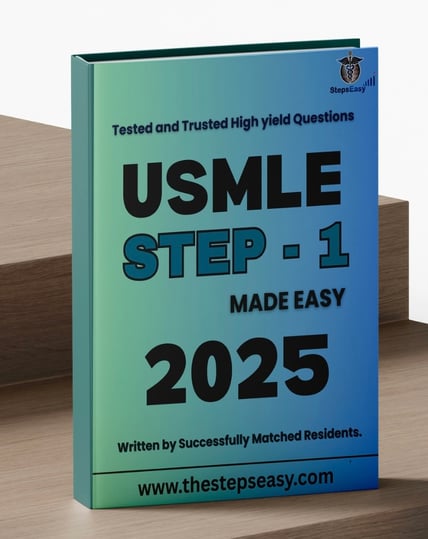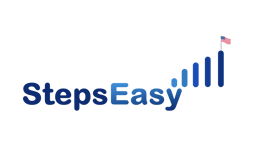Top 10 Most Googled USMLE Questions in 2025 — Answered by a Mentor Who’s Been There
By Dr. Tanishq Kesani- Founder, StepsEasy | Family Medicine, Onvida Health, AZ
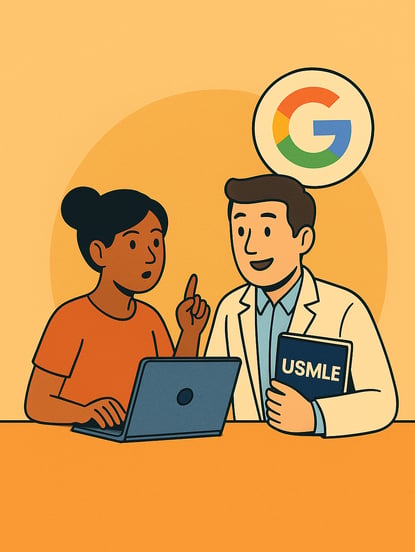

Introduction: Been There, Googled That
If you've ever typed “How do I pass USMLE Step 1 in 3 months?” into Google at 2 a.m. with a mix of hope and panic—you’re not alone. I’ve been there. In fact, I’ve lived that Google search, just like you.
When I started my own USMLE journey, I felt overwhelmed by the sheer volume of resources, advice, and opinions. I would bounce from Reddit threads to YouTube videos to blog posts, trying to piece together the “perfect” plan. Spoiler: there isn’t one. But there is a method to the madness—and that’s exactly what I want to share in this blog.
This post isn’t written by a robot or someone selling a magic solution. It’s written by someone who walked the walk. Someone who stayed up late with UWorld blocks, doubted himself, and still came out the other side with Step 2 CK 260+, Step 3 255+, and most importantly, matched into a U.S. residency. If I can do it, so can you.
Let’s answer the 10 most Googled questions about the USMLE in 2025—no fluff, just what works.
1. What is the best way to start studying for USMLE Step 1?
Start by knowing why you’re doing this. Not just for a license. Not just for a match. But for that version of you who dreams of seeing “MD” after their name in the U.S.
Practically? Start with First Aid + UWorld + Sketchy/Pathoma.
Don’t fall into the trap of over-resourcing. One of my early mistakes was trying to "collect" resources like Anki cards. Less is more. Pick the best and master them.
Tanishq Tip: I spent the first week not studying content, but mapping my study plan—what I would use, how long, and how I’d assess progress.
2. How long should I prepare for Step 1?
Honestly, it depends on your baseline. I took 8 months. Some take 6. Some take 12. What matters more than the number is the consistency.
You should study 6 days/week, 6–8 hours/day (with breaks), and include:
· 1–2 U-World blocks daily
· First Aid 5-8 pages/day
· Utilizing video resources for subjects only where necessary
· Include Micro/Pharma/Biochemistry/Genetics everyday
· Regular NBME assessments
Real Talk: It’s not about being perfect every day. It’s about stacking more good days than bad ones.
3. Which resources are most effective for USMLE preparation?
Here’s the gold-tier set I used:
· UWorld (non-negotiable)
· First Aid (your bible)
· Pathoma (for path)
· Sketchy (micro + pharm)
· Make your own flash cards – HOW? – Include 5-10 points every day in a separate notebook which you feel are highly volatile and they become 1200 points after your 4 months of prep.
Lesson Learned: Don’t try to finish everything 3 times. Aim to understand, not just “complete.”
4. How do I create an effective USMLE study schedule?
Make a plan that includes:
· Systems-wise breakdown (cardio, neuro, GI…)
· Daily UWorld questions
· Own Notes for spaced repetition
· Weekly Revision of systems completed + Including NBME assessments (from week 12 onwards)
What I Did: I printed out a 20-week calendar and hand-wrote weekly targets. Every tick mark kept me going. There’s power in physical tracking.
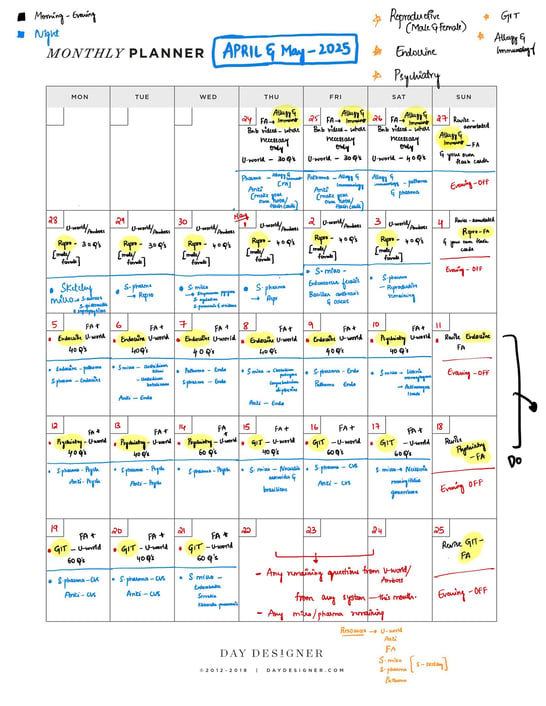

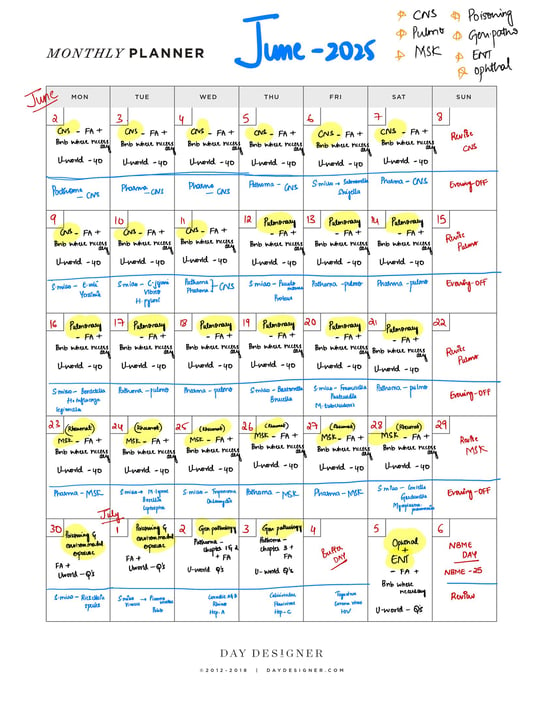

5. What are the common pitfalls to avoid during preparation?
· Too many resources
· Delaying NBME self-assessments
· Studying passively (just watching videos without active recall)
· Skipping breaks or burning out
Tanishq Truth: I took a 4-day break mid-prep because I burned out. Came back stronger. Don’t be afraid to pause to protect your momentum.
6. How important are practice exams, and which ones should I take?
Very important. You should take:
· NBME 25–31 (for Step 1)
· UWSA 1 & 2
· Free 120
They’re the best indicators of where you stand. Don’t wait until you feel “ready.” I took my first NBME at 40% prep—and scored low. But it taught me more than 10 chapters.
7. What strategies can help improve my test-taking skills?
· Timed UWorld blocks daily
· Review why every wrong and right answer is what it is
· Practice flagging and moving on from hard questions
My Strategy: I’d simulate test days every Sunday—2 UWorld blocks back-to-back, no distractions, with a break in between. By the exam day, it felt normal.
8. How do I stay motivated throughout the study period?
· Follow accounts like StepsEasy on Instagram—you’re not alone.
· Join study groups (Whatsapp, Telegram, Discord, your batchmates).
· Watch one success story a week—it works. I followed residents on LinkedIn and imagined myself in their shoes.
One Personal Moment: I stuck my Congratulations, You’ve Matched! on my wall with a note: “You’re doing this for the doctor you wanted to become at 18.” Some days, that was the only thing that kept me going.
9. What should I do in the final weeks leading up to the exam?
· Revise weak areas (based on NBME review)
· Do remaining NBME + Free 120 + UWSA 2
· Don’t start new resources
· Practice mindfulness or light cardio to stay sharp
Final Week Ritual: I stopped studying after 6 p.m. every day. Sleep > last-minute cramming. Trust what you know.
10. How can I manage stress and maintain well-being during preparation?
· 7+ hours of sleep
· Regular exercise (even walking + podcasts worked for me)
· Talk to friends, even if it’s just for 10 minutes a day
Tanishq Recipe: Cooking dinner became my study break. Try it. Something about chopping onions while listening to Divine Intervention was oddly healing.
Final Thoughts
The USMLE is tough, but not unbeatable. It’s not just a test of knowledge—it’s a test of endurance, mindset, and belief. You don’t have to do this alone.
That’s why I built StepsEasy—to give you the roadmap I wish I had.
Explore personalized mentoring, schedule planning, or residency help at thestepseasy.com or +916300727310(WhatsApp only)
Follow our journey and tips on Instagram: @_stepseasy_
DM “Step1Help” on Instagram for free planning templates and starter kits.
Your journey starts now—and We’re right here to walk it with you.
Note - Study tools mentioned in this blog—including UWorld, First Aid, Pathoma, Sketchy, and Anki—are the intellectual property of their respective creators and are widely used by USMLE aspirants worldwide. I do not own or endorse these companies, but recommend them based on personal experience and proven results.
